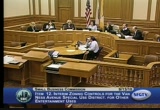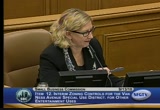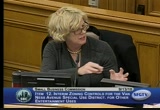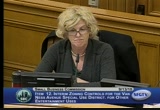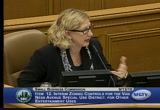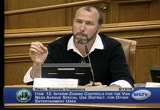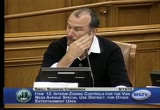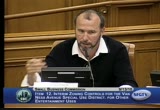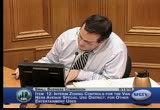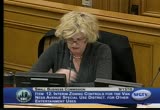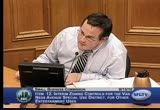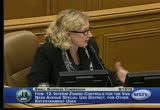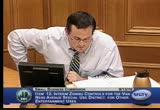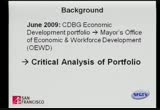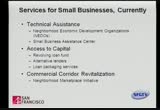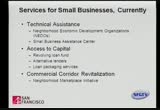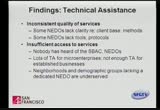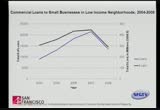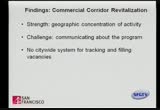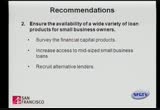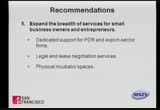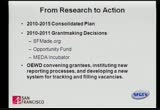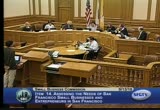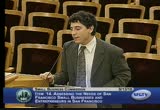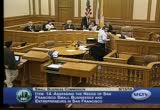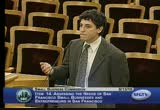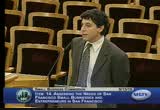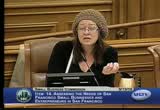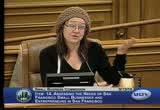tv [untitled] September 19, 2010 7:00pm-7:30pm PST
8:00 pm
we did open the -- >> we need to open it for public comments first. >> any public comment? seeing none, public comment is closed. >> commissioners, may i just make one suggestion? >> sure. >> that you do want to move to approve the resslation, but you may want to give an indication to the supervisors and the planning department in terms of items that you want to work with them on for the ordinance. >> very good. >> so it would be good for you to provide that list to staff in the motion. >> ok. >> chris, do you have that list? >> commissioners, i think i have a pretty good idea what your recommendations are around other entertainment use in
8:01 pm
terms of sizes. recognizing the difference between your coffee shoppach versus your potential nightclub. i think i can accurate reflect your comments in any letter. >> you about i do want to state that in the definition of "other entertainment," i'm not sure that a coffee shoppach is -- well, i think i want to hear more of a definition. i would prefer not to write the definition with the definition of a coffee shop but more of the type of entertainment. it could be different venues that want the same type of entertainment and not a specific type of business. >> i would like to address it in terms of levels of intensity
8:02 pm
of use rather than by where it is going to be. >> and could that be by capacity? >> i think i would be more comfortable leaving it just as what type, decibel levels or things like that. i could still see a situation -- i don't know, a restaurant is fairly large but wanted to have a little bit of music in a large area. i don't want to tie it to square footage. >> commissioners, if you could just point out, this ordinance, while it references 790.38 in the planning code, it doesn't propose any changes to that. so we would have to recommend either as part of this ordinance or as a separate item of legislation that they amend 790.38 and related codes. so are we asking that they consider that as part of this
8:03 pm
ordinance, or are we making these comments as part of our recommendation that we will be considering? >> i think we are going to say -- not with this. i think we are recommending it as-is, but we want to give some comments that we would like to, as a commission, work on making some changes and recommendations. we should go ahead and do that. >> i would like to put it out right now that i would be interested in working on this with commissioner dooleyy -- dooley, since you are already taking a lead role on it. >> yes. >> so i guess the question comes -- you can do a motion straight up. the commission approves
8:04 pm
recommendation to the board of supervisors. or you could do a motion that we have the approval, but our intention is to work with the planning department on making some modification to section 790.38 between now and the implementation of the ordinance , and the reason being is the small amplified music, and how that might relate so that there is the 18-month window to work on clarifying, giving more clarity to that definition. >> so let's just do the second one. >> i like that. >> i like that, too, because we are trying not to discourage business from interesting options. >> the second one? >> yes, the second one. who wants to make that motion. >> chris, do you have it? >> yes.
8:05 pm
>> commissioner o'connor, did you have a comment? >> yes, i do have a comment. just trying to react what is causing this legislation, there were a couple of problems on that street. without going detail because i am not exactly sure what they are, but i can guess, what has probably happened is the supervisor heard various complaints from residents in the area. what has happened is because van ness has gotten sleepy, and when something happens, it is a big deal. we are talking about a major thoroughfare in a major city, which is pretty dead. i am remembering in my mind. when i opened up my club in
8:06 pm
1997, the street was utterly dead. it was a significant thoroughfare, but it was totally dead. when i tried to open my business, the police objected, and i had to go to the board of permit appeals for a year and a half in order to beat them. five or six years later, what triggered and drove me to help create the small business assistance center is i had gotten so delayed by the sunni in a business that actually helped greatly turn the street around. so what i try to express to people is that if you want to help revitalize an area in this day and age, you're going to have to include liquor licenses. and with liquor licenses come challenges and an occasional problem. but that is part of the give and take of getting an area
8:07 pm
revitalized. i'm just putting it out there, that this seems like reaction area legislation on behalf of the supervisor, which i can completely understand why they want to do it. but it will create a hurdle that when anybody wants to come and do anything on that street, which i don't think many people are going to want to put a club there, but they are going to have to go in front of the planning commission, which will trigger neighborhood opposition, which will trigger their business not opening. i am not going to oppose this because i see the intent behind it, but i want to articulate why it is going on. >> i have had discussions with the planning department on their intent to turn some of these corridors, including van ness into more residential. >> yes. >> so i would imagine that would hair some bearing on this
8:08 pm
also. >> yes. whereas maybe the future of market street is more entertainment-driven because you don't have as many residences over. >> right. >> that makes sense. >> shall we make a motion? >> yes, let's go back to our motion. >> have you got it, chris? >> motion to support -- for now i have down item number 12 the resolution, motion to support with some noticing and comments to the board of supervisors that will be addressing and looking into potential changes to 790.9 8 of the entertainment code, and we will discuss this item further in commission. >> i move. >> all right. a second? >> i will second it. >> those in favor. >> aye, aye, aye, aye. >> ok, so item number 13?
8:09 pm
>> that is the ordinance. would that be continued to committee, would that be legislation or policy, or permitting? just to note, the permitting committee is looking at the issue of entertainment permits as it relates to similar uses. >> i had been starting to work on some of these planning code changes in general, but that doesn't mean it couldn't go to permitting. i'm looking at a number of areas. >> would you be able to -- >> but at the next policy committee -- >> we have someone coming in from the planning department to talk about another part of the code, formula retail. could we contact her and ask if we can add this to our list? what do you think?
8:10 pm
>> i think one is -- well, we dope want to table it because that means we are not going to consider it at all. if the resolution passes, there is an 18-month window, and my understanding is that this ordinance would not go into effect until after that 18 months. it still has to go between the planning department -- are you correct me? >> the ordinance would take effect after the ordinance passes. so it could be six months. but we can certainly request that we be involved in that. >> thanks for that correction. in case it takes up to 18 months to pass the ordinance, the resolution is in place for 18 months. so it is not an automatic guarantee it is for 18 months. well, i think -- the permitting
8:11 pm
committee is taking a look at making some modifications on -- taking a look at considering some moderate occasions -- modifications regarding entertainment permits, which could be amending this section, or it could be creating an additional section. but that is not to say that some of the larger discussions that are going to be happening at the legislation and policy committee, that the two can't con currently happen -- concurrently happen, but that we can have -- staff can be informing each committee on what is being discussed and worked on. >> so might we continue that to the call of the chair, and then we can determine where -- >> i think what we will do is
8:12 pm
we will assign this to both committees, continue it to both committees, and each committee's work as it applies to this ordinance. >> ok. thank you. next item? >> next item, please? >> commissioners, item 14. presentation and discussion on the report titled assessing the needs of san francisco small businesseses and entrepreneurs in san francisco. commissioners, we have a presentation by jordan klein, with the office of economic and work force development. >> welcome, jordan. >> let me switch it over. there you go. >> good evening, commissioners. i am pleased to have the opportunity to present to you this report, an assessment of the needs of small businesseses and entrepreneurs in san francisco. i completed it this past winter
8:13 pm
and spring on behalf of the office of economic and work force development. i was also completing my master of city planning at u.c. berkeley and it this was my master's thesis. in june of 2009, eowd adopted responsibility for managing a small portfolio of grants dedicated to economic development in san francisco that has formerly been managed by a different city department. this change prompted eowd to conduct a critical analysis of this portfolio, and they brought me on to conduct the learn. my research questions were what are the most pressing needs of small businesses in france that are owned by and serve low and moderate income people. and how successful are existing services for small businesses owners and entrepreneurs and how they are following falling
8:14 pm
short. basically it was a mix of speaking with economic development professionals and sexers, and talking -- and experts, and talking directly with small business owners. i used a wide variety of research methods to make sure i was getting good data. currently there is a variety of services for small business owners and entrepreneurs. they fall into three catgorse. there is technical assistance, a business planning course or a marketing course. a that is provided by our neighborhood economic development organizations, as well as a small business assistance center here in city hall. the second is access to capital or small business loans. we have alternative or non-profit lenders, or they
8:15 pm
help small business owners finish a loan application. we call that loan packaging. the third category is commercial corridor revitalization programs. our neighborhood mrkt place initiative targets specific commercial corridors in low and moderate income neighborhoods in the city and dedicates a staff person to those corridors. we call it a corridor manager who conducts outreach to the merchants on those corridors. so those are the three categories of services. my findings i am going to present to you by service category. i am going to start by presenting to you my findings about technical assistance. so, i found that there is inconsistent quality of technical assistant services. some of them use high quality tools to provide high quality services, and others unfortunately do not.
8:16 pm
there are no standard universal tools or standards for service provision, i found. i also found there is insufficient access to services. one of the main problems is that a lot of people don't know that these services even exist. they don't know about the sbac, and they don't know about the ndo's. i found there is a lot of technical assistant for micro enterprises and people starting new businesses, but there is insufficient help for owners of existing small businesses. i found that while some neighborhoods and demographic groups receive adequate services, others are under served. for example, the con ton ease -- canton ease community, we have had a problem providing small business assistance. finally, for technical assistance, insufficient bread this of services.
8:17 pm
i identified areas of demand for the kinds of services that don't exist. on access to capital, unsurprisingly over the last couple of years there has been reduced access to capital. i have heard from a lot of people that banks aren't making loans. then i looked at data from the community reinvestment act, and you can see how there has been a sharp decrease in 2008. if i had the 2009 data, you would see a continued decrease there. so now more than of those alternative loaners, the non-profit lenders are really important. they have seen demand for their services skyrocket. there is inconsistent quality of loan packagesing. some of the organizations have relationships wii the loan officers at the bank, and those organizations are able to do well and help the applicant meet the bank's needs, but other organizations aren't able to do that.
8:18 pm
i found that -- small businesses are having difficulty getting loans between $50,000 and $2 million. there are providers of smaller loans and providers of larger loans, but that sweet spot is missing. i am going to move on to commercial corridor revitalization. i found that our space programming is a strength. it enables us to reach out to a lot of businesses that we wouldn't otherwise reach. but we have a problem communicating about the neighborhood marketplace initiative. that limits our ability to leverage the success of that program. i also found there is no universal city-wide program for tracking and filling vacancies. i thought that was a key point. so those are my mindings. i have made a number of recommendations based on the findings. i am going to quickly go through those. first, improve the quality and
8:19 pm
accessibility of assistance. eowd knees to establish universal tools and standards for the providers. we need to encourage the grantees to do more outreach of owners of small businesses, rather than just serving people who want to start new ones. second, ensure a wide variety of loan products to small business owners. so in order to meet this goal, we need to first do research about what loan products are in demand and where that demand isn't being met. once we have a better understanding of that, we will be able to recruit alternative lenders and provide pressure and incentives on commercial lenders to do more small business lending. we need to improve the physical condition and organization of commercial corridors. the city needs to take a more active role in tracking and filling vacancies. we need to establish a
8:20 pm
universal system so that all of our partners can use it. fourth, we need to strengthen the network of economic development service providers and activities. we need our assistance providers to be, woulding more closely with corridor managers so they are able to do a better job of serving the client's needs. we need to expand the breadth of services for entrepreneurs. these are the areas of services there is demand for that doesn't exist. there has been no dedicated provider services for p.d.r. businesses, which we are trying to grow in it city. there is no provider. we need to make sure that exists. finally, we need to conduct further research regarding the climate for small business. a lot of the small business owners i spoke to wanted to talk about hot button issues like parking and taxation and
8:21 pm
streamlining the permitting process. that fell outside theper view of my research pocket, but clearly there is an interest there. finally, i wanted to close by saying this research is only a few months old, and we have already begun to take action on it. it formed the foundation of the city plan. it is our plan for -- our five-year plan for the city. it informed our 2010-2011 fwranlt-making decisions. there is an organization dedicated to meeting the needs of manufacturing businesses. we were their first funder, and we are really proud of the explosive growth they have seen and excited about what they are going to accomplish. finally, eowd has already been
8:22 pm
acting on some of those recommendations. we are taking a more active role of convening grantees, strengthening network providers and filling vacancies. that is what i have for you today, and i am eager to answer any questions you may have about this. >> thank you. what specifically are you working on in terms of helping to fill the vacancies? >> right. so we have a lot of -- you may be familiar with our neighborhood marketplace initiative. we have commercial corridor managers on, for example, third street, and a number of neighborhoods throughout the city. we have those folks on the ground. they know very well where there are vacant properties. we have other partners who also have a lot of intelligence about where there are
8:23 pm
vacancies. on the other hand we have people coming in to the sbac saying i want to open such and such and looking for a location. we have some people looking for spaces, and right now we don't have effective tools to connect them. i know that the case managers at the sbac have some lists that they manage. so when they hear about something, they write it down or do their best. they make their best effort within their capacity to fill it. but i think that the answer is going to be a technology solution. we've tried some tools in the past that either weren't universal, or they were unsufficiently accessible, or the user interface wasn't great. so i think that the solution is going to be to go with something really simple, really accessible. right now we are in the
8:24 pm
information-gathering phase. i am meeting with the sbac staff to figure out what are the right data points to be tracked, and meeting with other folks who have opinions on what this kind of system should be able to do. we hope to roll out an effective solution within the next few months. >> well, i hope so, because our outreach community has been working with this situation with vacancies, and it doesn't seem like we are getting a lot of responses. >> none. actually, none. >> do you want to talk about it? >> we started -- you know, we went local merchant organizations and neighborhood groups and asked them to kind of pick out their three or four most egregious vacancies, most long-term. many of them have been vacant
8:25 pm
for 10 or 20 years. we did outreach and asked the owners what we could do and what the situation was. as i recall up to this point, we have never received a single response back. so we have been working on this. >> i don't know if i have the right audio or not. >> i just have two comments. questions. one is the difficulties with the canton ese population, can you lab late on that? >> have you heard of the renaissance center of entrepreneurship? they offer a 10-week course in business planning and launching a business. we don't have anything like that in cantonese, for people who are mono lingual.
8:26 pm
this is one example. we have a variety of programs that we offer, and very few of them are accessible by contonese speakers. we do have strong programs available in the spanish language. this has been an issue for us. i am happy to report that just in the last six months or so, we have been working with the small business development center, and they have brought on someone who speaks mandarin and canton eese. his name is lawrence liu, and he is acting as a translator as needed or to connect clients with what they need. there is still a lot of progress to be made. i am hoping that within two years from now, we will be able to point to a much more complete stable of services for that population. >> and then my second
8:27 pm
observation is the p.d.r., no technical assistance is currently being offered specifically to what is considered production distribution and rare. is there a plan to address that at this point? >> well, as i mentioned, we are partnering now -- just as of this summer, we made a grant to an organization called s.f. made. they are specifically reaching out to businesses that have production within san francisco . they are providing a variety of technical assistance. they are mostly helping organizations with marketing, but also with h.r., with planning. >> ok. now for me, that is a very small, narrow band of -- you know, that is a very targeted and small narrow band of what is production distribution and
8:28 pm
rare. like film production, or commercial television production. it's a much bigger spectrum of businesses, small, medium and large, that foul into that category. it stood out for me because i began my time on the commission with a back street report. was that 2006 or 2007? >> it was 2007 actually. >> so it was completed in 2007, and it has been to my discouragement actually, not much was ever done with that report. a great deal of time, effort and money was put into that report, and very few of the recommendations ever seemed to come up or be followed through on. i am a little discouraged about that. >> i am sorry for steng out, but i wanted to ask. had you seen that report? >> yes, i had.
8:29 pm
i found it to be really informative. it informed my work and research questions. i appreciate that feedback. we are taking positive first steps, but i concede they are certainly only first steps. >> but they seem to be the same hit on the wheel. the wheel comes, and that first step has been taken repeatedly, and it isn't really to you i should address it. it is to our legislators that i should reserve my comments for because these reports are issued, and legislators don't seem to be able to integrate them very well with policy, and they don't follow through on those policies because they are always on to the next thing, the item dujure as opposed to the difficulty of the long-term planning process. planning process. it's a barrier.
62 Views
IN COLLECTIONS
SFGTV: San Francisco Government Television Television Archive
Television Archive  Television Archive News Search Service
Television Archive News Search Service 
Uploaded by TV Archive on

 Live Music Archive
Live Music Archive Librivox Free Audio
Librivox Free Audio Metropolitan Museum
Metropolitan Museum Cleveland Museum of Art
Cleveland Museum of Art Internet Arcade
Internet Arcade Console Living Room
Console Living Room Books to Borrow
Books to Borrow Open Library
Open Library TV News
TV News Understanding 9/11
Understanding 9/11